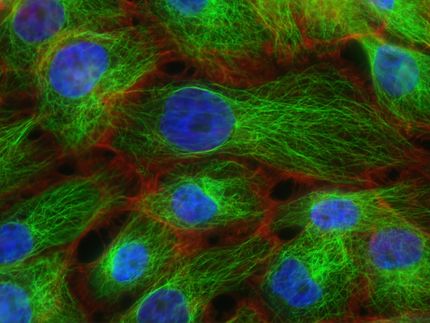New insights into cancer treatment
Cop1 protects against cancer rather than promoting it
Jean-Christophe Marine (VIB, K.U.Leuven) strongly argues against the use of Cop1-inhibitory drugs. The protein Cop1 has –for a long time - been seen as an attractive drug target for cancer. But Jean-Christophe Marine found out that Cop1 acts as a tumor suppressor, and thus inhibits tumor formation. His new data will have direct implications for the development of cancer drug targets.
Tumorigenesis: loss of control
Tumors form when control over the cell division is lost; a process that could be compared to losing control over the speed of your car. Two main players are involved; oncogenes which could be compared to the gas pedal of the car. A defective oncogene would be analogous to a gas pedal that is stuck in the 'on' position. In such a situation the tumor suppressor genes function as the brakes of the car - they keep the cell from dividing even in response to oncogene activation. If the brakes fail, the car goes out of control; similarly, when something goes wrong with the tumor suppressor genes, cell division gets out of control.
Cop1: brake or gas pedal?
Although Cop1 has been implicated in tumorigenesis, its precise role has remained a conundrum. Biochemical studies had shown that Cop1 promotes the degradation of target proteins. These studies, however, have yielded conflicting results leaving an open question as to whether Cop1 degrade tumor suppressors or oncogenes.
Several studies have indeed indicated that Cop1 favors tumorigenesis by inactivating one of the key tumor suppressors, p53. Accordingly, Cop1 overexpression was reported in breast and ovarian adenocarcinomas. Cop1 was therefore considered to be an oncogene and an attractive drug target for cancer therapy.
Solving the Cop1 puzzle has major implications for cancer drug development
Jean-Christophe Marine and his team now show that it is quite the opposite, namely that Cop1 functions as a tumor suppressor. Using an innovative mouse genetic engineering approach the VIB scientists generated Cop1-deficient mice. They show that these mice are highly tumor prone. They also show that Cop1 regulates the stability of the oncogene c-Jun and that deficiency of Cop1 stimulates cell proliferation of mouse and human cancer cells. In keeping with these data, they provide evidence that Cop1 expression is lost in various human cancers. Crucially for cancer therapy, they could find no evidence for the previously suggested role of Cop1 in the regulation of the tumor suppressor p53.
Other news from the department science

Get the life science industry in your inbox
By submitting this form you agree that LUMITOS AG will send you the newsletter(s) selected above by email. Your data will not be passed on to third parties. Your data will be stored and processed in accordance with our data protection regulations. LUMITOS may contact you by email for the purpose of advertising or market and opinion surveys. You can revoke your consent at any time without giving reasons to LUMITOS AG, Ernst-Augustin-Str. 2, 12489 Berlin, Germany or by e-mail at revoke@lumitos.com with effect for the future. In addition, each email contains a link to unsubscribe from the corresponding newsletter.






















































